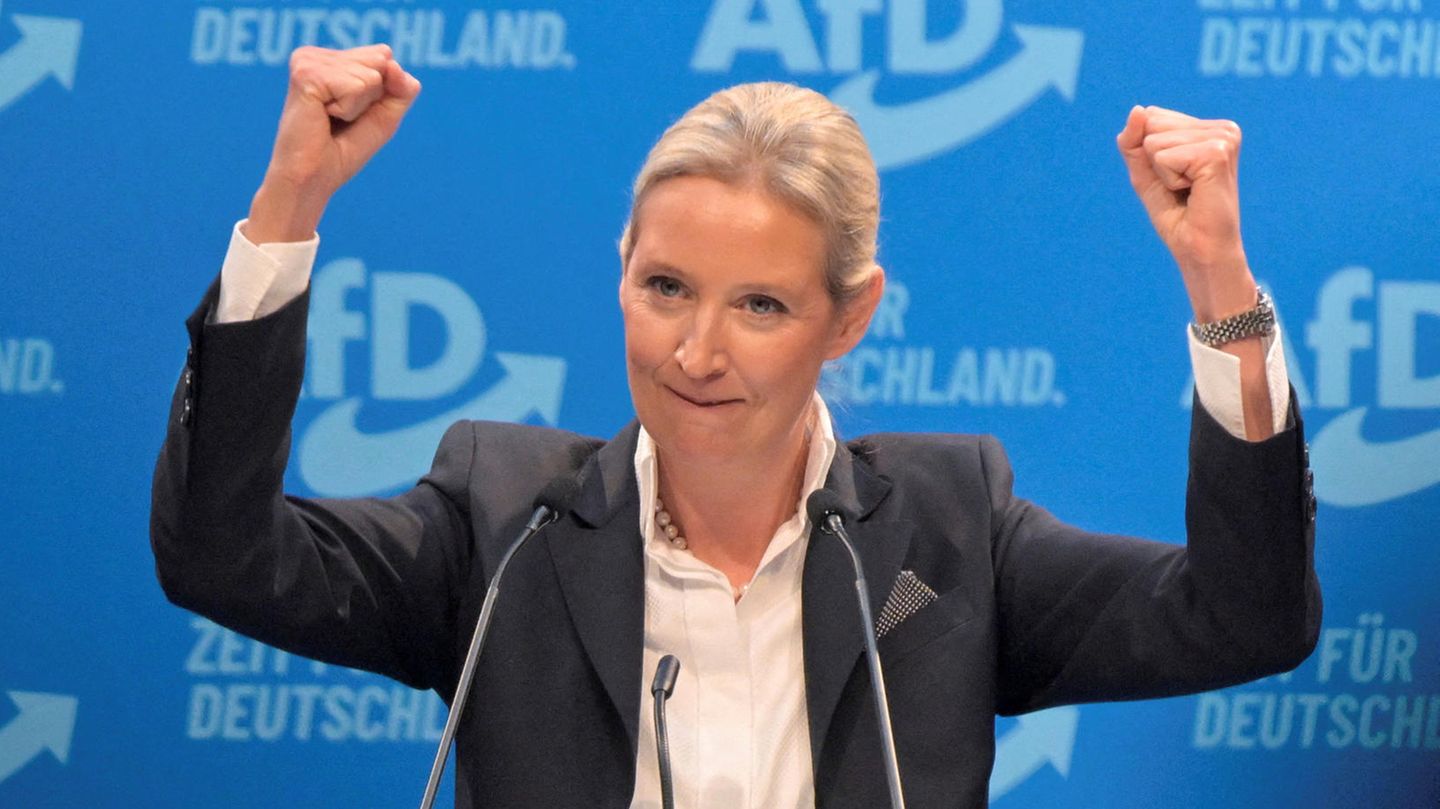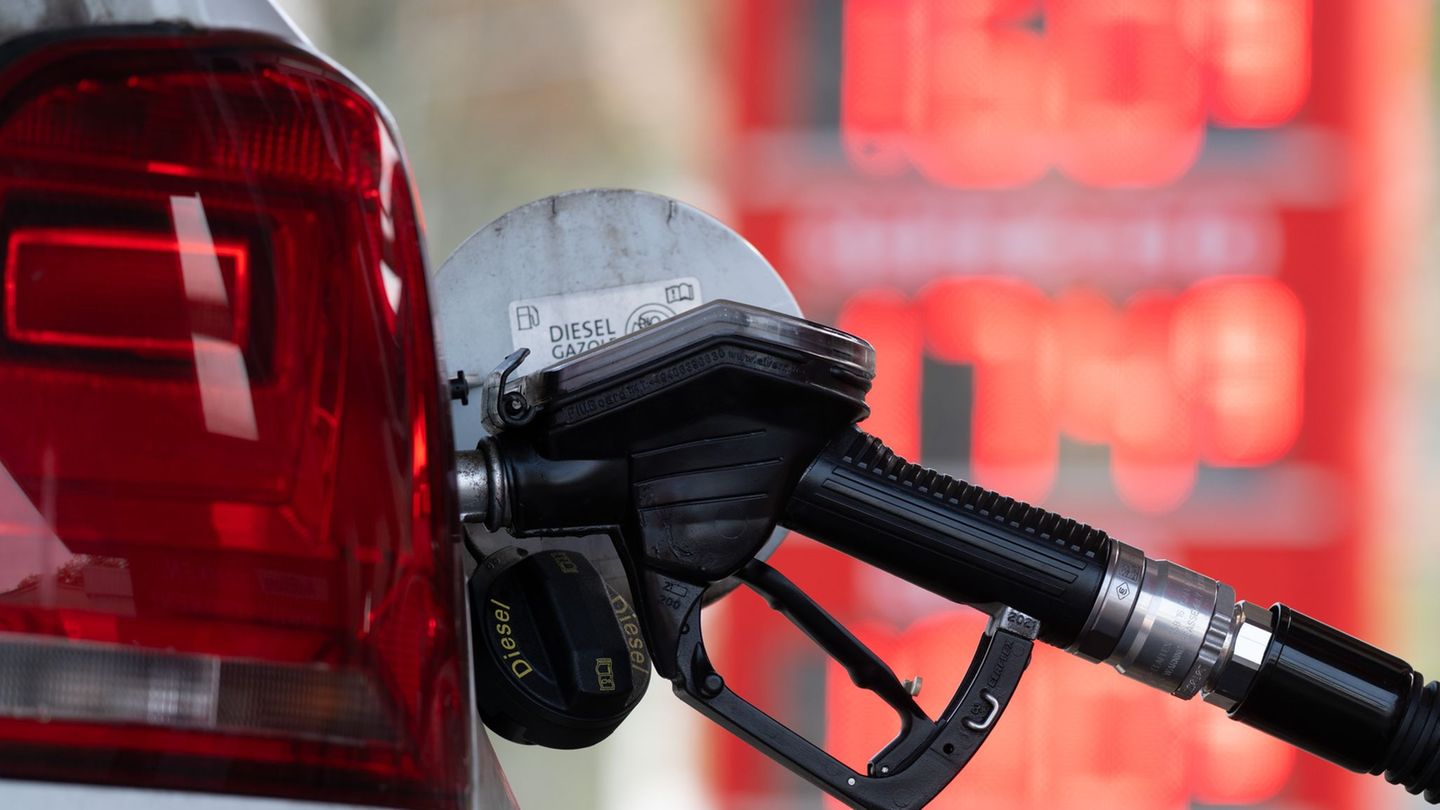Copy the current link
The AfD has never felt more powerful than now. Your candidate for chancellor Alice Weidel personifies the increased self-confidence. The new main opponent: the CDU.
There she stands, on the huge blue stage of the Riesa congress hall, framed by black, red and gold flags: the AfD’s first and now officially elected candidate for chancellor.
The vote was not secret; the approximately 600 delegates were asked to stand up collectively, which automatically eliminated the need for opposing votes. Who wants to openly admit being a deviant?
Now Alice Weidel smiles and looks down from the lectern at the people below her. She knows that now, on this Saturday lunchtime, she will give the audience what it desires: the maximum attack, hard and extreme.
Alice Weidel chants the word remigration
The fact that the AfD chairwoman calls the counter-demonstrators standing in front of the hall a “left-wing mob” of “red-painted Nazis” is just an overture. She has bigger plans.
The AfD, Weidel shouts, has a plan. And the first point of this plan is: “Close the borders completely”, simply “seal them” – and then “repatriations on a large scale”. She increases her volume: “If it’s supposed to be called remigration, then it’s called remigration!” She chants the last word: “RE-MI-GRA-TION!” – as if she hadn’t rejected it for a long time before.
The applause roars through the hall. Weidel looks extremely satisfied. She has now been in the AfD for more than eleven of her almost 46 years of life. She has led the Bundestag parliamentary group for seven years and has been party leader for three years. But this, the election as candidate for chancellor, is her greatest triumph to date, and she obviously wants to celebrate it properly.
“Down with the wind turbines of shame”
If the AfD is in power, she shouts, it will cut taxes, turn the nuclear power plants and the Nordstream gas pipeline back on – and, quite clearly, end all climate subsidies. Then she shouts: “When we’re at the helm, we’ll tear down all the wind turbines! Down, down with the wind turbines of shame!”
Now the hall is finally raging. Many delegates stand up, shout “Alice for Germany” or wave black, red and gold flags. Or they hold up cardboard hearts that say “Chancellor of Hearts.”
The production appears as perfect as the moment. Six weeks before the federal election, the AfD is at more than 20 percent, only the CDU is ahead of it. In Austria, FPÖ leader Herbert Kickl is heading for the chancellorship, in the USA Donald Trump is being inaugurated as president – and multi-billionaire Elon Musk, with whom Weidel recently chatted publicly about Hitler and the heating law, is broadcasting the two-day party conference live on his social channel X .
The conflicts remain with the AfD
But it’s just a moment for now. Riesa shows that the party will retain its conflicts. And so do the resistance forces against them.
Because even if rural Saxony has long been dominated by the AfD, those delegates who were unable to get hold of one of the few hotel beds in Riesa had difficulty getting to the party conference. The protest got up earlier, traveled by trains and 200 buses from Leipzig, Dresden or Berlin – and blocked access to the hall or even the city.
The first regional train, which arrives in Riesa shortly before six o’clock, is filled to capacity. The demonstrators’ strategy is as simple as it is effective: in small and large groups, they systematically block the access routes to Riesa. They sit on the streets and refuse to clear them. The main group forms a demonstration at the train station early in the morning.
The protest and the police pepper spray
The mood is disciplined. When a demonstrator throws a firecracker under a police vehicle, his own stewards reprimand him: “You are not welcome here!”
In total there are probably more than 10,000 demonstrators. Although thousands of officers are deployed with heavy equipment, the police have only limited control of the situation.
The main demonstration is held up halfway in the freezing cold for hours without the police communicating why. Emergency vehicles parked sideways block the way, and water cannons fire up behind them.
The usual game of cat and mouse begins. Some demonstrators from the Antifa black bloc attempt to break out. The police catch up with them, spray pepper spray, there are injuries on both sides. A left-wing politician later claimed to have been beaten unconscious.
Nevertheless, smaller groups can always break free. They jump over fences and run across muddy fields. In the end, they all somehow end up in front of the hall, where the meeting can only begin two hours late.
Chrupalla speaks of “terrorists”
It was after 12 p.m. when Weidel’s co-chair Tino Chrupalla opened the party conference – despite the “anti-democrats” and “terrorists” on the streets, as he shouts. The fact that even trade unions took part in the protest was “a shame”.
But the protest, Chrupalla is certain, will be of no use. “We are the best party in Germany,” he says, adding that the so-called firewall will fall like in Austria: “We will continue to fight with perseverance and patience.”
It is an ambivalent appearance for the co-party leader. He is now officially number 2 in the party, especially since his partnership with Weidel only harmonizes to a limited extent. The two don’t talk well about each other in internal meetings.
However, at least for the time being, Chrupalla has to submit. So he describes the candidacy for chancellor as his idea. He suggested and pushed Weidel through, he says, and he has her “back.” “I like to organize from behind.”
A coolly calculated alliance of convenience
This will apply at least until the federal election. But it is a coldly calculated working alliance. The party remains heterogeneous, both in terms of personnel and in terms of content.
This is also how the election program has to be decided in Riesa, and there are many controversial points in it. For example, compulsory military service: It was one of the party’s age-old demands until it was removed from the draft at the instigation of Chrupalla and some East German associations. Now she’s coming back in.
And then there is the JA, the Young Alternative, which has behaved in a particularly extreme manner and is now seen as a burden to the party leadership. With a change in the statutes, the organization should be separated and an integrated youth association should be founded instead, based on the model of the Junge Union.
A two-thirds majority is required for this. Most state associations support the application, while resistance comes from Brandenburg, Bavaria and North Rhine-Westphalia – and Thuringia.
Björn Höcke’s influence and its limits
The local head of state, Björn Höcke, would have preferred to postpone the YES issue. The matter was “not yet ready for a vote,” he told the party conference at the beginning star. “Not everyone has been taken away the way they should be taken away.”
But just a short time later, the motion not to take action did not go through. Höcke lost. As was the case at the party conference last summer in Essen, it became clear that he can hardly organize majorities anymore.
But that doesn’t mean that Weidel no longer has to take him into account. When she comes to the CDU in her speech and complains that they made a deal with “communists” in the election of prime ministers in Dresden and Erfurt, she specifically addresses him. “The real election winner in Thuringia is Björn Höcke,” she shouts to great applause. “There he sits!”
In general, the Union. Weidel senses how the CDU under Friedrich Merz is trying to focus on its issues, whether migration or internal security. The move to revoke German citizenship from criminals with dual passports sounds a lot like the AfD.
The frontal attack on the CDU
The candidate for chancellor is all the more bitter in attacking the CDU as a “fraud party,” while she barely mentions the SPD and the Greens. Where the Union rules, for example in Berlin, “queer-woker madness” reigns, while “knife murderers” and “New Year’s Eve bombers” are allowed to stay in the country.
Because according to Weidel, there is only one party that will really take action at schools and universities. “We are closing all gender studies programs and throwing out the professors!” she shouts. “So!”
This all comes from a woman who is raising two children in Switzerland with another woman who comes from Sri Lanka. Is the candidate for chancellor from a party that is not only right-wing and extreme, but also latently racist and homophobic, overcompensating for something?
After all, two motions want to ensure that the sentence “The family is the nucleus of our society” is clarified in the election program. According to this, a family should consist of “father, mother and children”.
Source: Stern
I have been working in the news industry for over 6 years, first as a reporter and now as an editor. I have covered politics extensively, and my work has appeared in major newspapers and online news outlets around the world. In addition to my writing, I also contribute regularly to 24 Hours World.





